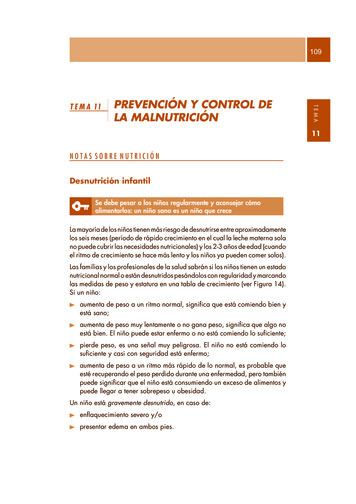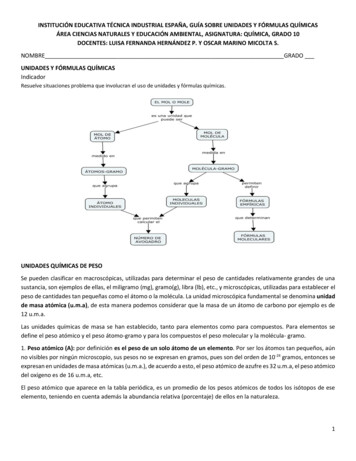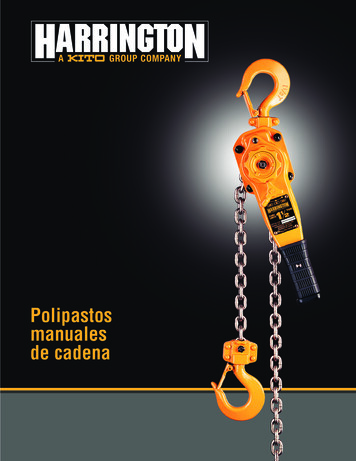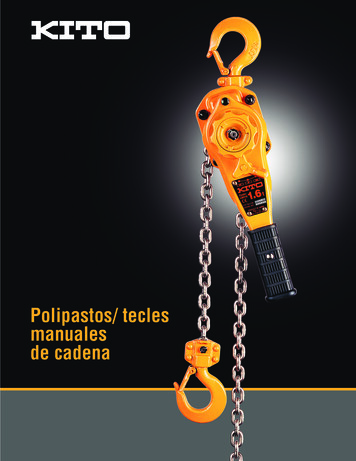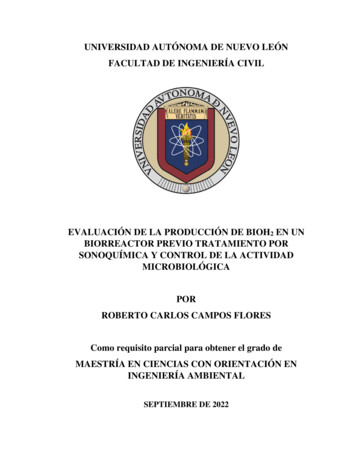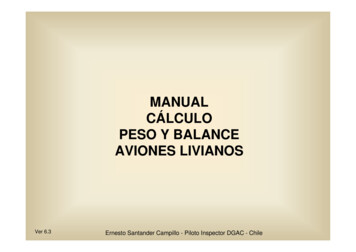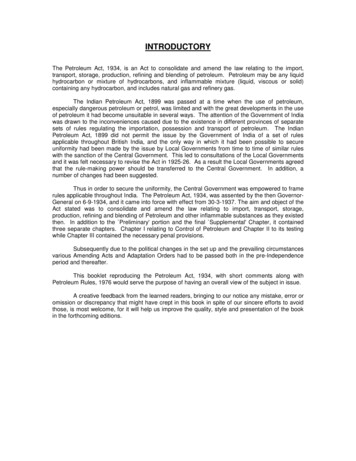
Transcription
INTRODUCTORYThe Petroleum Act, 1934, is an Act to consolidate and amend the law relating to the import,transport, storage, production, refining and blending of petroleum. Petroleum may be any liquidhydrocarbon or mixture of hydrocarbons, and inflammable mixture (liquid, viscous or solid)containing any hydrocarbon, and includes natural gas and refinery gas.The Indian Petroleum Act, 1899 was passed at a time when the use of petroleum,especially dangerous petroleum or petrol, was limited and with the great developments in the useof petroleum it had become unsuitable in several ways. The attention of the Government of Indiawas drawn to the inconveniences caused due to the existence in different provinces of separatesets of rules regulating the importation, possession and transport of petroleum. The IndianPetroleum Act, 1899 did not permit the issue by the Government of India of a set of rulesapplicable throughout British India, and the only way in which it had been possible to secureuniformity had been made by the issue by Local Governments from time to time of similar ruleswith the sanction of the Central Government. This led to consultations of the Local Governmentsand it was felt necessary to revise the Act in 1925-26. As a result the Local Governments agreedthat the rule-making power should be transferred to the Central Government. In addition, anumber of changes had been suggested.Thus in order to secure the uniformity, the Central Government was empowered to framerules applicable throughout India. The Petroleum Act, 1934, was assented by the then GovernorGeneral on 6-9-1934, and it came into force with effect from 30-3-1937. The aim and object of theAct stated was to consolidate and amend the law relating to import, transport, storage,production, refining and blending of Petroleum and other inflammable substances as they existedthen. In addition to the Preliminary' portion and the final Supplemental' Chapter, it containedthree separate chapters. Chapter I relating to Control of Petroleum and Chapter II to its testingwhile Chapter III contained the necessary penal provisions.Subsequently due to the political changes in the set up and the prevailing circumstancesvarious Amending Acts and Adaptation Orders had to be passed both in the pre-Independenceperiod and thereafter.This booklet reproducing the Petroleum Act, 1934, with short comments along withPetroleum Rules, 1976 would serve the purpose of having an overall view of the subject in issue.A creative feedback from the learned readers, bringing to our notice any mistake, error oromission or discrepancy that might have crept in this book in spite of our sincere efforts to avoidthose, is most welcome, for it will help us improve the quality, style and presentation of the bookin the forthcoming editions.
An Act to consolidate and amend the law relating to the import, transport, storage, production,refining and blending of petroleumWHEREAS it is expedient to consolidate and amend the law relating to import, transport,storage, production, refining and blending of petroleum. It is hereby enacted as follows:PRELIMINARY1.Short title, extent and commencement(1) This Act may be called the Petroleum Act, 1934(2 ) It extends to the whole of India.(3) shall come into force on such date as the Central Government may, by notification inthe official Gazette, appoint.2.DefinitionsIn this Act unless there is anything repugnant in the subject or context –(a)“Petroleum” means any liquid hydro-carbon or mixture of hydro-carbon and anyinflammable mixture (liquid, viscous or solid) containing any liquid hydro-carbon;(b) “petroleum Class A” means petroleum having a flash-point below twenty-threedegrees centigrade;(c)“petroleum Class B” means petroleum having flash-point of twenty-three degreescentigrade and above but below sixty-five degrees centigrade;(d) “petroleum Class C” means petroleum having a flash-point of sixty-five degreescentigrade and above but below ninety-three degrees centigrade;(e)flash-point” of any petroleum means the lowest temperature at which it yields avapour which will give a momentary flash when ignited, determined in accordancewith the provisions of Chapter II and the rules made thereunder;(f)“to transport petroleum” means to move petroleum from one place to another in Indiaand includes moving from one place to another in India across a territory which is notpart of India;(g)“to import petroleum” means to bring it into India by land , sea or air otherwise thanduring the course of transport;(h)“to store petroleum” means to keep it in any one place, but does not include anydetention happening during the ordinary course of transport;(i)“motor conveyance” means any vehicle; vessel or aircraft for the conveyance ofhuman beings, animals or goods, by land, water or air, in which petroleum is used togenerate the motive power;(j)“prescribed” means prescribed by rules made under this Act.(k)[Omitted]COMMENTSPetroleumUnlike the Indian Petroleum Act, 1899, under the present Act of 1934, petroleum has beencategorised as “Petroleum Class A”, “Petroleum Class B” and “Petroleum Class C”, dependingupon the flash point, but the definition of “petroleum” remains the same as it was under old Act.As per section 1 of Act 1862, petroleum' included any product thereof that give off aninflammable vapour at a temperature of less than 100 degrees fahrenheit. In Act 1868 it includedall such rock oil, Rangoon oil, Burma oil, any product of them and any oil, made from petroleum,coal, schist, shale, peat, or other bituminous substance, as gives off inflammable vapour at atemperature of less than 100 degree fahrenheit. A composition used for coating ship's bottomswhich contained 33 per cent of petroleum oil and an equal quantity of linseed oil mixed withpigments, gum, etc., so as to form a paint or paste as it gave an inflammable vapour at atemperature of less than 73 degree fahrenheit, notwithstanding that it was mixed with otheringredients, it was held to be petroleum under Act 1871 and 1879.
The definition of petroleum' in the Indian Petroleum Act, Act VIII of 1899, was of thecategorical kind. Section 2, defined the term “petroleum” as follows:“petroleum” includes also(i) the liquids commonly known by the names of rock oil, Rangoon oil, Burma oil,paraffin oil, mineral oil, kerosene, petroline, gasoline, benzine and benzol;(ii) any inflammable liquid which is made from petroleum, coal, schist, peat or anyother bituminous substance, or from any product of petroleum; and(iii) any liquid, or viscous mixture having in its composition any of the liquidsaforesaid;(iv) but it does not include any oil ordinarily used for lubricating purposes andhaving its flashing point at or above two hundred degrees of fahrenheit'sthermometer."The term “petroleum” as used in the Petroleum (Consolidation) Act, 1928 included crudepetroleum oil from petroleum, or from coal, shale, peat or other bituminous substances, and otherproducts of petroleum. It includes kerosene although it has not been implicitly stated thus underthe Petroleum Act as to whether kerosene could be said to be a dangerous petroleum but surelycommonsense would suggest that it be included in non-dangerous petroleum.-K.C. Sachdeva v.State, (1976) 2 Cr LJ 1208 p. 1209.Cinematograph films having nitrocellulose base will fall within definition of petroleum'.1984 AIR 34. Petroleum includes Kerosene oil also.-Sachdeva, K.C. v. State (1976) 2 Cri LJ1208.Flash point Flash point' of any petroleum means the lowest temperature at which the petroleum yieldsa vapour which will furnish a momentary flash or flame when ignited according to the provisionsof Chapter II of the Act, Sections 14 to 22 and the rules made thereunder in Chapter X of therules which is embodied in rules 187 to 189.To Transport PetroleumThe expression “to transport petroleum “means to move petroleum from one place toanother in India and also across a territory which is not a part of India-Superintendent andRemembrancer of Legal Affairs-Indur Chandra Das, AIR 1932 Cal 456.To ImportExpression “to import” means, to bring petroleum into the territory of India by any means,whether by land, sea or air, but it does not comprehend petroleum in the course of transport.Govind Ram v. King Emperor, AIR 1924 All 558.If once the petroleum comes across the border of the country for and on account of theaccused with his consent the offence of importing into India is complete, if it has been broughtwithout a licence in an unauthorised way. It did not cease to be imported by the accused simplybecause it had been interrupted in transit by the customs authorities.-Ram Tikaya v. The CrownAIR 1927 Lah 191.PrescribedIn exercise of the powers conferred by sections 4, 5, 14, 21, 22 and 29(1) of the PetroleumAct, 1934, the Central Government made the Petroleum Rules, 1976 which came into force on 18-1976.
CHAPTER ICONTROL OVER PETROLEUM3. Import, transport and storage of petroleum(1) No one shall import, transport or store any petroleum save in accordance with the rulesmade under section 4.(2) Save in accordance with the conditions of any licence for the purpose which he may berequired to obtain by rule made under sec. 4, no one shall import petroleum Class A, and no oneshall transport or store any petroleum.COMMENTSNo licence is needed for import, transport or storage of small quantities of petroleum Class A andtransport or storage of limited quantities of petroleum Class B or petroleum Class C.Kerosene isnot “dangerous petroleum” and no licence is necessary to store less than 500 gallons in drums ofless than 50 gallons capacity and thus, the charge for possessing Kerosene of less than 500gallons without licence is unsustainable-K.C. Sachdeva v. State (1976) 2 Cri LJ 1208.4. Rules for the import, transport of petroleum:The Central Government may makes rules(a) prescribing places where petroleum may be imported and prohibiting its import elsewhere;(b) regulating the import of petroleum;(c) prescribing the periods within which licences for the import of petroleum class A shall beapplied for, and providing for the disposal, by confiscation or otherwise, of any Petroleum ClassA in respect of which licence has not been applied for within the prescribed period or has beenrefused and which has not been exported;(d) regulating the transport of petroleum;(e) specifying the nature and condition of all receptacles and pipelines in which petroleum maybe transported;(f) regulating the places at which and prescribing the conditions subject to which petroleum maybe stored;(g) specifying the nature, situation and condition of all receptacles in which petroleum may bestored;(h) prescribing the form and conditions of licence for the import of Petroleum Class A and for thetransport or storage of any petroleum, the manner in which applications for such licences shall bemade, the authorities which may grant such licences and the fees which may be charged for suchlicences;(i) determining in any class of cases whether a licence for the transport of petroleum shall beobtained by the consignor, consignee or carrier;(j) providing for the granting of combined licences for the import, transport and storage ofpetroleum, or for any two of such purposes;(k) prescribing the proportion in which any specified poisonous substance may be added topetroleum and prohibiting the import, transport or storage of petroleum, in which the proportion ofany specified poisonous substance exceeds the prescribed proportion; and(l) generally, providing for any matter which in its opinion is expedient for proper control over theimport, transport and storage of petroleum including the charging of fees for any service renderedin connection with the import, transport and storage of petroleum.5. Production, refining and blending of petroleum:(1) No one shall produce, refine or blend petroleum save in accordance with the rules madeunder sub-section (2).(2) The Central Government may make rules(a) prescribing the conditions subject to which petroleum may be produced, refined or blended;and(b) regulating the removal of petroleum from places where it is produced, refined or blended andpreventing the storage therein and removal therefrom, except as petroleum Class A of any
petroleum which has not satisfied the prescribed tests.(3) [Omitted]COMMENTSSection 5 imposes restrictions as to the production, refining and blending of petroleum whichcould be done only in accordance with the rules framed by the Central Government prescribingthe conditions subject to which petroleum may be produced, refined or blended and theregulations imposed for regulating the removal of petroleum from places where it is produced,refined or blended and preventing the storage therein and removal therefrom of any petroleumwithout prescribed and certified testing. Petroleum Class A is not covered by these regulations.The relevant rules governing production, refining and blending of petroleum are given in thePetroleum Rules, 1976, Chapters VII, VIII and IX, relating to “licences”, “Refining and Blending ofpetroleum”, “Tetra Ethyl Lead Mixtures”, and “Testing of petroleum”, respectively6. Receptacles of dangerous petroleum to show a warning:All receptacles containing petroleum Class A shall have a stamped, embossed, painted or printedwarning either on the receptacle itself, or, where that is impracticable, displayed near thereceptacle, exhibiting in conspicuous characters the words “Petrol” or “Motor Spirit”, or anequivalent warning of the dangerous nature of the petroleum:PROVIDED that this section shall not apply to(a) any securely stoppered glass, stoneware or metal receptacle of less than ten litres capacitycontaining Petroleum Class A which is not for sale, or(b) a tank incorporated in a motor conveyance, or attached to an internal combustion engine, andcontaining petroleum intended to be used to generate motive power for the motor conveyance orengine, or(c) a pipe-line for the transport of petroleum, or(d) any tank which is wholly underground, or(e) any class of receptacles which the Central Government may, by notification in the OfficialGazette, exempt from the operation of this section.7. No licence needed for transport or storage of limited quantities of petroleum ClassB orpetroleum ClassC:Notwithstanding anything contained in this Chapter, a person need not obtain a licence for thetransport or storage of(i) petroleum Class B if the total quantity in his possession at any one place does not exceed twothousand and five hundred litres and none of it is contained in a receptacle exceeding onethousand litres in capacity; or(ii) petroleum Class C if the total quantity in his possession at anyone place does not exceedforty-five thousand litres and such petroleum is transported or stored in accordance with the rulesmade under sec. 4.COMMENTSA person who has no intention of storing or keeping petroleum but merely orders it with theintention of having it stored on licensed premises belonging to another person, is not required tohave a licence under the Act or the rules framed thereunder.-Kalabhai Mahomedalli v. Emperor,AIR 1937 Bom 11.Kerosene is not dangerous petroleum' and no licence is needed to store less than 500 gallonscapacity. In the instant case it is not disputed that ten drums of kerosene oil were found in thepremises of the applicant, the capacity of one drum being less than 50 gallons hence, the said tendrums could not have been more than 500 gallons; and in view of Section 7 of the Petroleum Actno licence is required if the quantity of kerosene oil stored does not exceed 500 gallons.-K.C.Sachdeva v. State (1976) 2 Cr LJ 1208.8. No licence needed for import, transport or storage of small quantities of petroleumClass A:(1) Notwithstanding anything contained in this Chapter, a person need not obtain a licence for
the import, transport or storage of petroleum Class A not intended for sale if the total quantity inhis possession does not exceed thirty litres.(2) Petroleum class A possessed without a licence under this section shall be kept in securelystoppered receptacles of glass, stoneware or metal which shall not, in the case of receptacles ofglass or stone ware, exceed one litre in capacity or, in the case of receptacles of metal, exceedtwenty-five litres in capacity.9. Exemptions for motor conveyance and stationary engines(1) The owner of a motor conveyance, who complies with the requirements of the law for the timebeing in force relating to the registration and licensing of such conveyance and its driver or pilotand the owner of any stationary internal combustion engine, shall not be required to obtain alicence.(a) for the import, transport or storage of any petroleum contained in any fuel tank incorporatedin the conveyance or attached to the internal combustion engine, or(b) for the transport or storage of petroleum Class A, not exceeding one hundred litres inquantity in addition to any quantity possessed under Cl. (a):PROVIDED that the petroleum isintended to be used to generate motive power for the motor conveyance or engine:PROVIDED FURTHER that the total quantity of petroleum Class A which may be stored without alicence under cl. (b) shall not exceed one hundred litres notwithstanding that such owner maypossess other motor conveyance or engines.(2) Petroleum Class A transported or stored without a licence under cl. (b) of sub-section (1)shall be kept as provided in sub-section (2) of Sec. 8, and, if it exceeds thirty litres in quantity,shall be stored in an isolated place which does not communicate with any room where anyperson resides or works or in any room where persons assemble.10. No licence needed by railway administration acting as carrier:Notwithstanding anything contained in this Chapter, a railway administration, as defined in sec. 3of the Indian Railways Act, 1890 (9 of 1890), need not obtain any licence for the import ortransport of any petroleum in its possession in its capacity as carrier.COMMENTSRailway administration have elaborate rules for the carriage of petroleum by rail as provided inthe Indian Railways Act and the Rules made thereunder. Consequently s. 10 of the PetroleumAct exempts them from the need of taking out any licence in respect of petroleum in theirpossession as carrier.11. Exemption of heavy oilsNothing in this Chapter shall apply to any petroleum which has its flash-point not below ninetythree degrees centigrade.12. General power of exemptionThe Central Government may, by notification in the Official Gazette, exempt any petroleumspecified in the notification from all or any of the provisions of this Chapter.COMMENTSThe power to grant exemption under this section is a general power of the Central Governmentprovided by the Legislature.13. Inspection of places(1) The Central Government may authorize any officer by name or by virtue of office to enter anyplace where petroleum is being imported, stored, produced, refined, or blended, or is undertransport, and inspect all receptacles, plant and appliances used in connection with petroleum inorder to ascertain if they are in accordance with the provisions of this Chapter and the rules madethereunder.(2) The Central Government may make rules regulating the procedure of officers authorizedunder this section.
COMMENTSThe Act provides for three types of inspections and so it has been mentioned in sections 13, 14and 26 of this Act. Section 13 relates chiefly to administrative inspections by qualified technicalinspectors. Section 14 gives a purely routine power to take samples for testing of any petroleumfound therein. Section 26 is intended to bring to light evasions of the Act, particularly theconcealment of unlicensed stocks, and contains a power of entry and search. The powers underthese three sections are kept separate as they may be exercised by different officers.
CHAPTER IITHE TESTING OF PETROLEUM14.Inspection and sampling of petroleum:(1) The Central Government may, by notification in the Official Gazette, authorize any officer byname or by virtue of office to enter any place where petroleum is being imported, transported,stored, produced, refined or blended and to inspect and take samples for testing of any petroleumfound therein.(2) The Central Government may make rules-egulating the taking of samples of petroleum fortesting;(b) determining the cases in which payment shall be made for the value of samples taken andthe mode of payment, and enerally, regulating the procedure of officers exercising powers underthis section.COMMENTSAll tests of petroleum under the Act will have to be carried out by specially appointed testingofficers issuing certified instruments. Any private enterprise may submit a test apparatus of itsown for certification. Whoever for the time being in control or incharge of any place wherepetroleum if being imported, transported, stored, produced, refined or blended, refuses, orneglects to show to any officer authorised under this section any petroleum in such place, or togive him such assistance as he may require for the inspection of such petroleum or refuses toallow him to take samples of the petroleum, shall be punishable with simple imprisonment whichmay extend to one month with or without fine which may extend to one thousand rupees.15. Standard Test Apparatus:(1) A standard apparatus for determining the flash-point of petroleum shall be deposited with anofficer to be appointed in this behalf by the Central Government by notification in the officialGazette.(2) Such apparatus shall be engraved with the words “Standard Test Apparatus”, and shall beverified and corrected from time to time and replaced, when necessary, in accordance with rulesmade under Sec. 21.(3) The Standard Test Apparatus shall, on payment of the prescribed fee, be open to inspectionat all reasonable times by any person wishing to inspect it.COMMENTSRules 191 to 198 of the Petroleum Rules, 1976 deal with standard test apparatus, method of test,procedure when tests show waof uniformity, certificates of test, Register of certificates, fee forinspection and comparison and fee of testing.16. Certification of other test apparatus:(1) The officer appointed under Sec. 15 shall, on payment of the prescribed fee, if any, comparewith the Standard Test Apparatus and apparatus for determining the flash-point of petroleumwhich may be submitted to him for this purpose.(2) If any apparatus is found by him to agree with the Standard Test Apparatus within prescribedlimits, the officer shall engrave such apparatus with a special number and with the date of thecomparison, shall give a certificate in respect of it in the prescribed form, certifying that on thesaid date the apparatus was compared with the Standard Test Apparatus and was found to agreewith it within the prescribed limits, and specifying any corrections to be made in the results of testcarried out with the apparatus.(3) A certificate granted under this section shall be valid for such period as may be prescribed.(4) A certificate granted under this section shall, during the period for which it is valid, be proof,
until the contrary is proved, of any matter stated therein.(5) The officer shall keep a register in the prescribed form of all certificates granted by him underthis section.COMMENTSAfter comparison if the apparatus is found to agree with the Standard Test Apparatus within theprescribed limits, the officer shall engrave such apparatus with a special number with the date ofsuch comparison and grant a certificate along with the same, specifying any corrections to bemade in the results of tests carried out with the apparatus.17. Testing officers:The Central Government may authorize any officer by name or by virtue of office to testpetroleum of which samples have been taken under this Act, or which may have been submittedto him for test by any person, and to grant certificates of the results of such tests.18. Manner of test:All tests of petroleum made under this Act shall be made with a test apparatus in respect of whichthere is valid certificate under Sec. 16, shall have due regard to any correction specified in thatcertificate, and shall be carried out in accordance with rules made under Sec. 21.19. Certificate of testing:(1) The testing officer after testing samples of petroleum shall make out a certificate in theprescribed form, stating whether the petroleum is petroleum Class A or petroleum Class B orpetroleum Class C, and if the petroleum is petroleum Class B or petroleum Class C, the flashpoint of the petroleum.(2) The testing officer shall furnish the person concerned, at his request, with a certified copy ofthe certificate, on payment of the prescribed fee, and such certified copy may be produced in anycourt in proof of the contents of the original certificate.(3) A certificate given under this section shall be admitted as evidence in any proceedings whichmay be taken under this Act in respect of the petroleum from which the samples were taken, andshall, until the contrary is proved to be conclusive proof, that the petroleum is petroleum Class Aor petroleum class B or petroleum Class C, and, if the petroleum Class B or petroleum Class C,of its flash-point.COMMENTSThis section obligates the testing officer to prepare the certificate in the prescribed form, classifythe petroleum, and mention in case of Class B or C petroleum, the flash-point of the petroleum, toissue a certified copy of the certificate which is to be admitted inevidence in any proceedingsunder this Act as conclusive proof, regarding its classification to Class A, B or C petroleum and itsflash-point unless the contrary is proved.20.Right to require re-test:(1) The owner of any petroleum, or his agent, who is dissatisfied with the result of the test of thepetroleum may, within seven days form the date on which he received intimation of the result ofthe test, apply to the officer empowered under sec. 14 to have fresh samples of the petroleumtaken and tested.(2) On such application and on payment of the prescribed fee, fresh samples of the petroleumshall be taken in the presence of such owner or agent or person deputed by him, and shall betested in the presence of such owner or agent or person deputed by him.(3) If, on such re-test, it appears that the original test was erroneous, the testing officer shallcancel the original certificate granted under sec. 19, shall make out a fresh certificate, and shallfurnish the owner of the petroleum, or his agent, with a certified copy thereof, free of charge.
21. Power to make rules regarding tests:The Central Government may make rules(a) for the specification, verification, correction and replacement of the Standard Test Apparatus;(b) Prescribing fees for the inspection of the Standard Test Apparatus;(c) regulating the procedure in comprising a test apparatus with the Standard Test Apparatus;(d) prescribing the form of certificate to be given in respect of a test apparatus so compared, andthe period for which such certificates shall be valid;(e) prescribing the form of the register of such certificate;(f) Prescribing fee for comprising a test apparatus with the Standard Test Apparatus;(g) regulating the procedure of testing officer in carrying out tests of petroleum, providing for theaveraging of results where several samples of the same petroleum are tested, and prescribingthe variations from standard temperature which may be allowed;(h) prescribing the form of certificates of tests of petroleum and the fees which may be chargedtherefor;(i) providing, where the results of the testing of samples raise a doubt as to the uniformity of thequality of the petroleum in any lot under test, for the division of the lot into sub-lots, and for theselection and testing of samples of each sub-lot and for the averaging of results in accordancewith the results of those samples;(j) prescribing fees for re-tests under section 20 and providing for their refund where the originaltest was erroneous; and(k) generally, regulating the procedure of all officers performing duties connected with the testingof petroleum, nd providing for any matter incidental to such testing.22.Special rules for testing viscous or solid forms of petroleum:The Central Government may also make rules providing specially for the testing of any form ofpetroleum which is viscous or solid or contains sediment or thickening ingredients, and such rulesmay modify or supplement any of the provisions of this Chapter or of the rules made undersection 21 in order to adapt them to the special needs of such tests.
CHAPTER IIIPENALTIES AND PROCEDURE23.General penalty for offences under this Act:(1) Whoever(a) in contravention of any of the provisions of Chapter 1 or of any of the rules made thereunder,imports, transports, stores, produces, refines or blends any petroleum, or(b) contravenes any rule made under sec. 4 or sec. 5, or(c) being the holder of a licence issued under Sec. 4 or a person for the time being placed by theholder of such licence in control or in charge of any place where petroleum is being imported orstored, or is under transport, contravenes any condition of such licence or suffers any condition ofsuch licence to be contravened, or(d) being for the time being in control or in charge of any place where petroleum is beingimported, stored, produced, refined or blended or is under transport, refuses or neglects to showto any officer authorized under section 13 any receptacle, plant or appliance used in such place inconnection with petroleum, or in any way obstructs or fails to render reasonable assistance tosuch officer during an inspection, or(e) being for the time being in control or in charge of any place where petroleum is beingimported, transported, stored, produced, refined or blended, refuses or neglects to show to anyofficer authorized under section 14 any petroleum in such place, or to give him such assistanceas he may require for the inspe
required to obtain by rule made under sec. 4, no one shall import petroleum Class A, and no one shall transport or store any petroleum. COMMENTS No licence is needed for import, transport or storage of small quantities of petroleum Class A and transport or storage of limited quantities of petroleum Class B or petroleum Class C.Kerosene is

